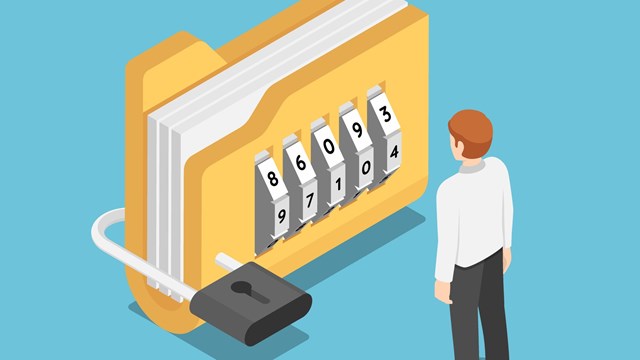
The issue of intellectual property and an individual’s right to privacy has become a greater concern since more and more people conduct their lives online—whether for banking, social media or dating. While the aforementioned generally have security features encrypted in programming platforms, there remain justifiable concerns as to what is actually protected. This heightened sense of scrutiny results in ancillary privacy concerns, especially for those living in community associations.
Whether it is the installation of security cameras, insider criminal activity or environmental health concerns, both boards and residents have to be aware of state laws and governing documents. Cases of privacy intrusion happen from coast to coast. Last year, for example, a Florida family living in a penthouse suite sued its community association for cell phone towers that were installed on their roof without permission causing loud noises and health risks. In Hawaii, a security guard was arrested for copying residents’ keys and stealing credit card and banking information.
“Any rule adopted by a board must be reasonable and rationally related to the objective to be served,” explains attorney Anne P. Ward of the law firm of Ehrlich, Petriello, Gudin, & Plaza, P.C in Newark, New Jersey. “It is a given that owners of units must relinquish '…a certain degree of freedom of choice which they might otherwise enjoy with separate privately owned property.' A “balancing test” is used weighing the rights of an owner against those of the entire community to determine the reasonableness of any rule.”
The “Rules” of Privacy
In all states, a person has the right against unreasonable, substantial or serious interference with his or her privacy. Above and beyond this mandate, there are federal and state electronic records laws, health privacy laws, laws regulating what information may be released by the government and by employers and laws regarding the unauthorized use of a person’s name or image.
One of the perks of living in a community association or townhome community is that it offers residents the ability to build equity and have control of their home without the headaches of funding and maintaining a single-family home. But shared community living does possess certain restrictions and questions regarding privacy. While residents may think that their unit and information is off limits to members of the board and management, this is not always the case. “Most governing documents such as the master deed, declaration, or bylaws give the association a right of access to the unit or dwelling for maintenance, inspection, and other related reasons,” says attorney Mark Imbriani of Somerville, New Jersey. “However, except in the case of an actual emergency involving a real and immediate threat to person or property, the right of access can only be exercised on notice and with the owner’s consent. Entering a unit without permission is an invasion of the owner’s privacy.”
Imbriani also says that, “It should be part of an association’s adopted policy or code of conduct that no board member disclose information, matters, or discussions which relate to any matters falling within attorney client privilege, pending or anticipated litigation, or contract negotiation, or any matter which would constitute an unwarranted invasion of individual privacy, and any matter involving the employment, promotion, discipline or dismissal of any employees or officer of the association.”
While association meetings normally permit open attendance, if boards do wish to discuss matters that are private such as those relating to resident finances, they can go into executive session. “New Jersey Community association Law 46:8B-13 provides that meetings of a board shall be open to attendance by all unit owners “except that the governing board may exclude or restrict attendance at those meetings, or portions of meetings, dealing with (1) any matter the disclosure of which would constitute an unwarranted invasion of individual privacy.” Thus, the community association law recognizes that there will be instances when the members’ right to access a community association’s records must be subordinate to an owner’s right to privacy in confidential information,” Ward explains.
Who is Watching Whom?
While it is plausible and common for boards to grant reasonable access to a unit for maintenance reasons, there are issues that can cause trepidation for residents and tenants alike, even if their respective best interests, or that of the community, are guiding the motion. One example is security cameras.
“Security cameras and the associated technology have become more and more common. As long as the camera is placed in a common area and where it will not capture images of individual’s private or intimate parts prior consent is not required,” Imbriani explains.
Ward agrees adding, “Clearly, the personal safety of residents and the preservation of common elements are of paramount interest to the board. Measured against the foregoing standard, it seems that use of security cameras to monitor access to and use of the common elements is a reasonable exercise of the board’s duties.”
Another concern that may arise is a board handing out information to third parties, whether the association's attorney or other residents. n some communities, even information such as addresses and telephone numbers can be requested by other residents but boards and management must be careful with items such as financial records and executive meeting minutes. “Association staff needs to be properly trained to exercise discretion in terms of responding to requests from third parties for information pertaining to an individual unit owner. Such requests my come from law enforcement agencies, attorneys’ offices, lenders, etc. Personal information obtained by the association and management staff should not be disclosed to third parties without proper authority, i.e., subpoena or court order. However, even in such a case, the association should consult with the association lawyer before responding to a subpoena or court order,” Imbriani says.
Ward adds, “In N.O.C. v. Schaefer, 197 N.J. Super. 249, 484 A.2d 729 (1984), the court held that when public disclosure of private facts is “highly offensive to a reasonable person” a person’s privacy has been violated. A board must keep this standard in mind when determining if information should be shared with all owners. A board should never share information with a third party without first obtaining an owner’s consent, absent extraordinary circumstances directly implicating the safety of the entire community association community.”
In some cases, boards will require that all guests and service personnel sign in and out when visiting the building. While this again is commonplace in many buildings, concerned parties are sometimes wary of why this information is needed. “A guests’ sign-in sheet is a tool designed to alert management to the presence of non-residents on the property. Given its objective of residents’ security, it seems a reasonable exercise of a board’s power,” Ward says.
Along with daily visitors, many boards will also limit the number of days or weeks that a resident can host a guest. Ward says this is an acceptable practice, “but only if the board can show that the specifics of such a rule are rationally related to a lawful objective of the board.”
Overstepping Boundaries
As long as boards adhere to state statutes and association documents, they are able to make as many security-based or privacy enhancements as desired. However, the board and management have to be careful—violating a resident's privacy could bring legal ramifications. Imbriani explains that in New Jersey, the tort of invasion of privacy refers to four types of privacy invasions and includes the following circumstances: intrusion (such as intrusion on plaintiff's physical solitude or seclusion, as by invading his or her home, illegally searching, eavesdropping or prying into personal affairs), public disclosure of private facts (such as making public private information about plaintiff, placing plaintiff in a false light in the public eye (which need not be defamatory, but must be something that would be objectionable to the ordinary reasonable person) and appropriation, for the defendant's benefit, of the plaintiff's name or likeness.
Imbriani goes on to say that if an association or individual is responsible for a breach of privacy, they could be named as a defendant in a civil suit seeking money damages. While Directors & Officers coverage would provide some assistance, there is no guarantee that the case will end favorably for them.
If a unit owner or shareholder believes the board or management company may have overstepped the line, the first step would be to express their concern at a meeting or with a written request. “As a final resort, an owner can file suit seeking an order enjoining the board from enforcing a rule an owner considers unlawful or considers an example of overreaching by the board,” Ward says. Privacy in community associations and associations is a very delicate issue. Boards and association managers should familiarize themselves with rules in the New Jersey Condo association Act as well as their governing documents to ensure the proper information is kept confidential and that their practices are not intrusive to the lives of residents. Balancing privacy and security in a community association setting is a balancing act that boards and managers must take very seriously. However, when done properly, residents can be safe and secure in their own homes and in the knowledge that their investment is well-protected.






Leave a Comment